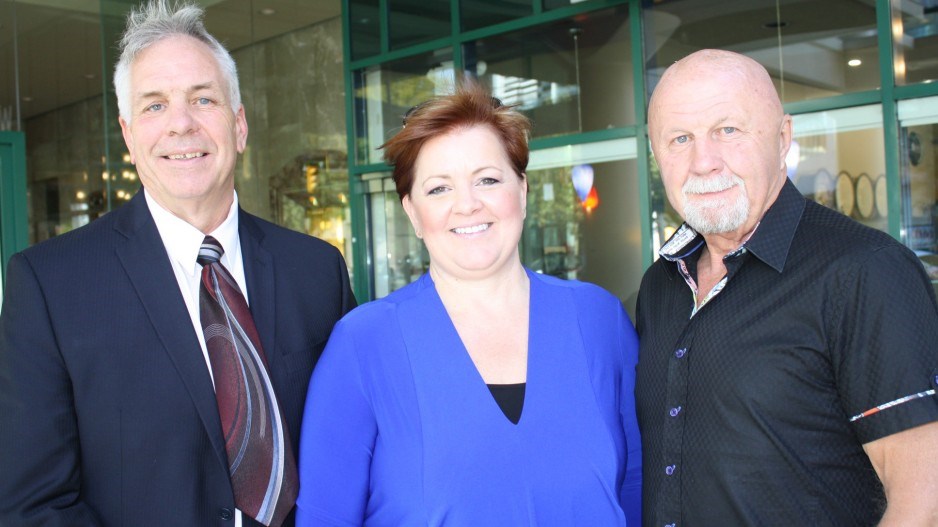A coalition of mayors from the Peace region are calling on the provincial government to level the playing field by collecting provincial sales taxes from contractors from Alberta, where there is no provincial sales tax.
The mayors of Fort St. John, Taylor and Fort Nelson were in Vancouver September 14 to lobby the B.C. government’s Commission on Taxation Competitiveness, which has been gathering feedback from businesses and ordinary citizens on business taxes and competitiveness.
Ever since the government was forced by referendum to reinstated the PST – which had been harmonized with the federal GST – many B.C. businesses have chaffed under it.
Since there is zero chance the government will go back to a harmonized sales tax, it has been trying to find ways to at least ease some sore spots for business.
The Peace region’s proximity to Alberta, and a natural gas sector that draws many of the same workers and contractors who work in the Alberta oil and gas fields, creates a unique problem for the region, according to the Northeast BC Resource Communities Coalition.
The problem is that many workers and who work in the Peace region’s gas fields don’t live there – they live in Alberta – and often don’t pay the PST.
That not only puts B.C. contractors at a competitive disadvantage, it also means the B.C. government is losing out on tax revenue, the coalition says.
“There are rules in place that says they’re supposed to comply with the PST rules,” said Taylor Mayor Rob Fraser.
But it appears some have been “flying under the radar with respect to enforcement.”
The coalition studied the problem after B.C. contractors complained and concluded that there is a tax disadvantage for B.C. contractors.
The coalition is asking for stepped up enforcement and education so that out-of-province contractors are made aware that they need to pay the PST when working in B.C. and making purchases here.
It also wants policies similar to Saskatchewan that require out of province contractors to be registered.
Another problem is income tax. Many of the workers in Northeastern B.C. spend more time in B.C. than Alberta, even though their home address is in Alberta, which means their income taxes go into Alberta coffers, not B.C.’s.
That is largely a function of the man camp. Instead of encouraging their workers to live where they work, many companies chose to fly workers in and out and have them live in work camps.
These work camps contribute little to the local economies, and yet rely on their services – hospitals, for example, and police and fire protection.
Bill Streeper, mayor of the northern Rockies Regional Municipality (Fort Nelson), said said his community is overtaxed in more ways than one.
When he says Fort Nelson is being over-taxed by a transient workforce, he doesn’t mean sales or income taxes – he means local services are being strained by companies and workers who don’t pay taxes that support those services.
“We’re lobbying for the people to be located in our community,” Streeper said. “We don’t want our towns to be completely taxed to the limit – and I don’t mean money-wise – to support a workforce that’s transient, which it is. Our airports are taxed, our hospitals are taxed, our RCMP are taxed.”
Communities like Fort Nelson have plenty of room for these workers, as many homes and apartments there now sit empty. Fort Nelson’s population has dropped from about 6,800 to below 5,000 in the last couple of years, Streeper said, and in 2013, there were an estimated 3,000 workers living nearby in work camps.
Lori Ackerman, mayor of Fort St. John, said the B.C. government does not even know how many transient workers or work camps are in B.C. at any given time.
She said she has no issue with temporary work camps for projects that are, by nature, temporary – like the Site C dam project, for example, or a pipeline project.
But there are workers who work in gas processing plants and other midstream operations – permanent positions – who also live in work camps.
“The ongoing maintenance and operations of that facility should be done by people who live in the area, contribute to the community,” Ackerman said.
But concerns about transient workers is something that is well beyond the ambit of the tax competitiveness commission.
The coalition acknowledges that it also has to lobby industry. But getting a level playing field on things like income and sales taxes is an important part of the process of getting people who work in the Peace to live there.
As long as there is a tax advantage to working in B.C. but living in Alberta, there’s little incentive to move to B.C., coalition members say.




